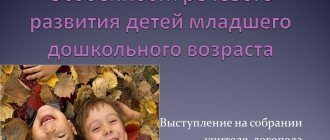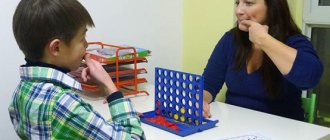If a child is surrounded by criticism, he learns to blame. If a child sees hostility, he learns to fight. If a child is surrounded by tolerance, he learns to be tolerant. If a child is supported, he learns confidence. If a child is ridiculed, he learns to be timid. If a child is constantly shamed, he learns to be guilty. If a child is approved, he learns to like himself. If a child is accepted and treated kindly, he learns to find love in the world.
Doris Know Nault
Recently, my personal speech therapist website began to exist, which was created in order to share useful information for both parents and teachers. Come visit: personal website of the teacher and speech therapist “KU KA RE KU”
About Me
Hello! Let me introduce myself - Svetlana Viktorovna Mnatsakanyan, teacher and speech therapist. By education, I am a special education teacher and a special psychologist for working with children with developmental disabilities. Specialization - Speech Therapy. In 2004, she graduated from Moscow Pedagogical State University and began her journey to a country where the most important inhabitants are children))).
I have enjoyed working with children since early childhood. She always willingly stayed to look after the younger children in the yard and loved to spend time with her mother in the kindergarten, where she worked as a teacher. A lot of time has passed since then, but the reaction of the children with whom I work remains unchanged: they like to learn and they look forward to our meetings. The secret is simple: all training is based on game moments, replacing each other and alternating different types of activities with an interval of 3-5 minutes. I use an adapted and modern approach to teaching, and am constantly looking for new methods of presenting information. For example, I try to use ICT technologies in the educational process. I also develop COR games - presentations that children can play (and while playing, develop) both in class and at home.
My view of the world
“To respect every person as ourselves, and to treat him as we wish to be treated—there is nothing higher than this.” – Confucius
"Everything is in our hands, so they can not be omitted". - Coco Chanel
“The most precious thing a person has is life. It is given to him once, and he must live it in such a way that it does not cause excruciating pain for the years spent aimlessly.” – Nikolai Alekseevich Ostrovsky
I think that the above statements most fully reflect my view of the world. I am absolutely sure that respect, openness, understanding, goodwill are what should form the foundation of any human relationship. Therefore, I try to treat every person, regardless of their age, gender and social status, with all openness, in accordance with these fundamental moral qualities.
My portfolio
The work of a speech therapist teacher begins with the development of children's attention, visual and auditory perception (recognition and discrimination), memory and thinking. This is a necessary basis for the development of all aspects of speech. The most fertile period for overcoming speech disorders is preschool age. It is at this time that children quickly learn to speak correctly and get used to the new pronunciation of sounds more easily. It is important not to miss this time, contact a speech therapist teacher in kindergarten on time! Correct, beautiful, coherent speech is the key to a child’s successful education at school, mastering not only his native, but also foreign languages. Therefore, the work of a speech therapist teacher in a kindergarten is to develop the speech of children in general, prevent speech disorders, prepare children for learning to read and write, as well as develop attention, hearing, memory and thinking.
Add educational material to portfolio Code for inserting a list of publications on other sites
My publications:
Add certificate to portfolio
My achievements
Awards 1. Letter of gratitude No. 185 dated 04.27.10
(City Information and Methodological Center of the city of Vladimir) 2. Letter of gratitude No. 396 dated 15.11.10 (City Information and Methodological Center of the city of Vladimir) 3. Letter of gratitude No. 520 dated 11/17/11 (City Information and Methodological Center of the city of Vladimir) 4. Letter of thanks No. 19 dated 05/17/11 (Municipal budgetary preschool educational institution)
“Kindergarten No. 6” of Vladimir)
5. Letter of thanks dated 17.05. 12 (Municipal budgetary preschool educational institution "Kindergarten No. 6" in Vladimir) 6. Certificate of participation in the 11th pedagogical marathon of educational subjects 03/27/13. (City Information and Methodological Center of the city of Vladimir) 7. Letter of gratitude No. 151k-p dated 09/04/12
(
Department of Education of the Vladimir City Administration) Publications: 1. Certificate No. 506 for the publication of an article in the collection of materials
of the International Correspondence Scientific and Practical Conference
“New educational technologies”, on the topic:
“Development of creative abilities of preschool children in speech therapy classes,” 2013.
2.Certificate No. 507 for publication of an article in a collection of materials
International correspondence scientific and practical conference
“New educational technologies”, on the topic: “Individual classes on the development of auditory perception and the formation of pronunciation in children with hearing impairment, as a factor in their successful socialization”, 2013 (GOU VPO “Moscow State University of Technology and Management” branch in Cheboksary Center for Remote Intellectual Projects "Intel")
Teacher - speech therapist in a preschool institution
Some parents, fortunately, do not even know why a speech therapist is needed in kindergarten . And parents of children with speech disorders had to come into close contact with the science of speech therapy and get acquainted with specialists in this field.
Speech therapy is the science of speech disorders, their overcoming and prevention through special correctional education and upbringing, which is one of the sections of special pedagogy - defectology, and is divided into preschool, school and adult. This article will mostly be devoted to preschool speech therapy . Speech therapy, which combines medicine, psychology and pedagogy, and without knowledge of the basics of these specialties, can be useless and sometimes “dangerous”
.
A kindergarten teacher-speech therapist is a multidisciplinary specialist who works with all types of speech disorders in preschool children.
What functions does a speech therapist perform in kindergarten ? A speech therapist in kindergarten conducts a complete and detailed examination of each child to determine the characteristics of his speech development. Most often this happens at the beginning of the school year, special examination protocols are used, the child’s medical record is studied, parents are interviewed, and if necessary, the speech therapist can refer the child for a consultation with an ENT doctor, an ophthalmologist, a neurologist, an audiologist, or a defectologist. Ideally, a conclusion about a child’s speech development is made collectively: by a speech therapist , a psychologist and a neurologist . And after this, the speech therapist , taking into account the characteristics of the child’s psyche and the severity of the speech defect, selects a speech correction program.
The speech correction program is carried out in stages, and in most cases, includes:
- formation of correct speech breathing,
- development of phonetic perception,
- normalization of speech motor skills,
-correction of sound pronunciation disorders,
- overcoming impairments and developing the lexical and grammatical aspects of speech,
- development of connected speech.
the speech therapist then teaches him the elements of literacy and prepares him for studying at a comprehensive school. The duration of the correction program depends on the severity of the speech disorder, the psychological and neurological status of the child, and on the professionalism of the speech therapist . Each lesson conducted by a speech therapist in kindergarten is a whole range of games and exercises, as well as various types of gymnastics and massages for children’s tongues. In classes, the speech therapist uses toys , pictures, musical instruments and a lot of various teaching aids. And the most important attribute of the classes is the mirror, in front of which most tasks are performed. has speech therapy instruments - probes for massage and sound production. A speech therapist in kindergarten regularly conducts not only frontal (classes with the whole group), but also subgroup and individual classes.
What speech disorders does a speech therapist correct in kindergarten ?
1. Impaired oral speech:
- dyslalia (tongue-tied)
– disturbance of sound pronunciation with normal hearing and preserved innervation of the speech apparatus;
-dysarthria – a violation of the pronunciation side of speech, caused by insufficient innervation of the speech apparatus;
-rhinolalia – disturbance of voice timbre and sound pronunciation caused by anatomical and physiological defects of the speech apparatus;
- stuttering is a violation of the tempo-rhythmic organization of speech, caused by the convulsive state of the muscles of the speech apparatus;
-bradylalia – pathologically slow rate of speech;
-tachylalia - pathologically accelerated rate of speech;
-alalia is the absence or underdevelopment of speech due to organic damage to the speech areas of the cerebral cortex in the prenatal or early period of a child’s development.
In addition to problems with oral speech, children suffer from a written language disorder, which is corrected at school.
2. Violation of means of communication:
-FNR – phonetic speech underdevelopment. This is a violation of sound pronunciation with normal physical and phonemic hearing and the normal structure of the speech apparatus. There may be a disorder of a single sound or several sounds at the same time. Such disorders may manifest themselves:
• in absence (omission)
sound - aketa instead of rocket
• in distortions - throaty pronunciation of the sound r, buccal pronunciation - sh, etc.
Incorrect pronunciation can be observed in relation to any consonant sound, but less often those sounds that are violated are those that are simple in the method of articulation and do not require additional movements of the tongue (m, n, p, t; most often violated:
- whistling sounds - S, Z (and their soft pairs, C;
-hissing sounds – Ш, Ж, Х, Ш;
- sonorant (lingual)
– L, R
(and their soft pairs)
;
-rear lingual – K, G, X (and their soft pairs)
.
Most often, a speech therapist in kindergarten takes children with FND for six months.
-FFNR - phonetic-phonemic speech underdevelopment. This is a violation of the processes of formation of the pronunciation system (native)
language in children with various speech disorders due to defects in the perception and pronunciation of sounds.
With intact physical hearing, children cannot distinguish or confuse similar sounds (whistling and hissing; sonorant; soft and hard; voiced and dull)
.
For example, when asked to repeat a number of different sounds or syllables , the child repeats all sounds or syllables as the same (pa-pa-pa instead of pa-ba-pa)
.
And, when a speech therapist in kindergarten asks what sounds he hears? The kid replies that the sounds are the same. It is not physical, but phonemic hearing (hearing for phonemes)
. And, as a result of a number of reasons, it turns out to be disturbed or unformed.
A phoneme is the minimum unit of sound structure of a language. Each phoneme in speech is represented by its own variants (allophones)
. A phoneme has a main variant - a sound in a strong position: for vowels - this is the position under stress, for consonants - the position before the vowel or sonorant.
Several conditions are identified in the phonetic-phonemic underdevelopment of children:
• difficulties in analyzing sounds that are disturbed in pronunciation;
• with formed articulation, inability to distinguish sounds belonging to different phonetic groups;
• inability to determine the presence and sequence of sounds in a word.
The main manifestations characterizing FFNR:
1. Undifferentiated pronunciation of pairs or groups of sounds, i.e. the same sound can serve as a substitute for two or more sounds for a child. For example, instead of the sounds “s”
,
“ch”
,
“sh”
the child pronounces the sound
“s”
:
“syumka”
instead of
“bag”
,
“syasya”
instead of
“cup”
,
“syapka”
instead of
“hat”
.
2. Replacement of some sounds with others that have simpler articulation, i.e. complex sounds are replaced by simple ones. For example, a group of hissing sounds can be replaced by whistling sapka instead of hat, “r”
is replaced by
"l"
laketa instead of rocket.
3. Mixing of sounds, i.e. unstable use of a number of sounds in different words. A child can use sounds correctly in some words, but in others replace them with similar ones in articulation or acoustic characteristics. For example, a child can correctly pronounce the sounds “r”
,
“l”
and
“s”
in isolation (i.e. one sound, not in a syllable or word, but in speech utterances instead of
“red cow”
he says
“lyzaya kalova”
.
In addition to the listed features of pronunciation and phonemic perception, children with FFDD exhibit: general blurred speech, unclear diction, some delay in the formation of vocabulary and grammatical structure of speech (errors in case endings, use of prepositions , agreement of adjectives and numerals with nouns).
A speech therapist in kindergarten children with such a speech disorder for correctional classes throughout the year.
-ONR – general speech underdevelopment. As the name suggests, with this type of disorder, all components of the speech system, that is, the sound side (phonetics)
– violation of sound pronunciation and phonemic perception;
semantic side (lexis, grammar)
- poor vocabulary, few generalizations, synonyms, antonyms, etc., errors in inflection and word formation, difficulties in coordinating words; poor development of coherent speech - the ability to tell and retell.
Children with OHP are characterized by:
•later onset of speech: the first words appear by 3-4 years, phrasal speech of two words by 5 years;
• speech is full of agrammatisms (irregular forms and variants of words)
and not sufficiently phonetically designed;
• expressive speech lags behind impressive speech, that is, the child, while understanding the speech addressed to him, cannot correctly voice his thoughts;
• the speech of children with ODD is difficult to understand.
Most often, when talking about ODD, they mean speech disorders in children with normal intelligence and hearing. The fact is that with hearing or intellectual impairments, speech underdevelopment, of course, occurs in most cases, but in this case, OHP already has the character of a secondary defect.
The formation of correct speech development is a complex process - it requires the joint work of a doctor - a neurologist, speech therapist , psychologist, educator, music worker, and physical education specialist. This work must be coordinated and comprehensive. By actively influencing the child with specific professional means, teachers build their work on the basis of general pedagogical principles. At the same time, by identifying objectively existing points of contact between various pedagogical areas, each teacher does not carry out his work in isolation, but complementing and deepening the influence of others. Therefore, taking into account the individual characteristics of each child with speech impairments, preschool education specialists outline a unified set of joint correctional and pedagogical work aimed at the formation and development of the motor, intellectual, speech and social-emotional spheres of personality development of a preschool child.
And at the end of my work, I would like to say that parents play an equally important role in the speech development of children. Therefore, in addition to classes with the child, the speech therapist in the kindergarten provides consultations to parents, during which he explains to the parents the child’s speech defect and teaches the necessary techniques and exercises for homework.



